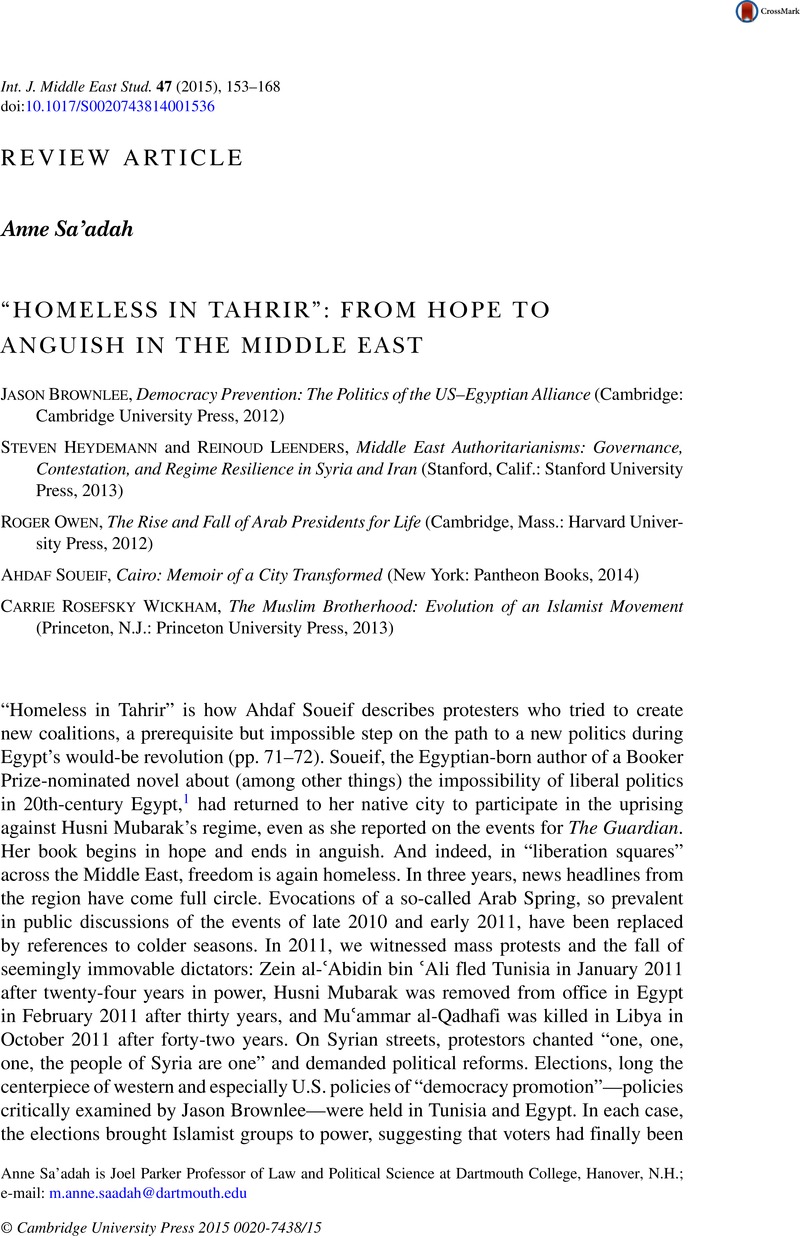Article contents
“HOMELESS IN TAHRIR”: FROM HOPE TO ANGUISH IN THE MIDDLE EAST
Published online by Cambridge University Press: 09 February 2015
Abstract

- Type
- Review Article
- Information
- Copyright
- Copyright © Cambridge University Press 2015
References
NOTES
1 Soueif, Ahdaf, The Map of Love (New York: Anchor Books, 1999)Google Scholar.
2 From the print edition of the New York Times, 28 July 2014, articles on pp. A4 (Iraq, Afghanistan), A5 (Libya), and A1 (Gaza).
3 Lewis, Bernard, What Went Wrong?: The Clash between Islam and Modernity in the Middle East (Oxford: Oxford University Press, 2002)Google Scholar. See also Lewis, Bernard, “Historiography: What Went Wrong? Some Reflections on Arab History,” The American Scholar 62 (1993): 601–5Google Scholar.
4 See discussion in Ayubi, Nazih N., Over-Stating the Arab State: Politics and Society in the Middle East (London: I. B. Tauris, 1995), 447–59Google Scholar.
5 Kassir, Samir, Considérations sur le malheur arabe (Paris: Actes Sud, 2004)Google Scholar.
6 Keddie, Nikki R., “Is There a Middle East,” International Journal of Middle East Studies 4 (1973): 256Google Scholar.
7 The term is loosely borrowed from the Egyptian sociologist Saad Eddine Ibrahim, who referred to the Egyptian regime as a “gumlukiyyya,” a combination of republic and monarchy.
8 Wickham, Carrie Rosefsky, The Muslim Brotherhood: Evolution of an Islamist Movement (Princeton, N.J.: Princeton University Press, 2013), passim, for example, p. 71Google Scholar.
9 “Electoral authoritarianism” is the subject of a growing literature in political science; see e.g., Schedler, Andreas, ed., Electoral Authoritarianism: The Dynamics of Unfree Competition (Boulder, Colo.: Lynne Rienner, 2006)Google Scholar and Levitsky, Steven and Way, Lucian A., Competitive Authoritarianism: Hybrid Regimes after the Cold War (Cambridge: Cambridge University Press, 2010)CrossRefGoogle Scholar. Levitsky and Way code Egypt as noncompetitive because of the legal handicaps imposed on the Muslim Brotherhood (p. 34).
10 See Sayyid-Marsot, Afaf Lutfi, Egypt's Liberal Experiment, 1922–1936 (Berkeley, Calif.: University of California Press, 1977)Google Scholar.
11 Human Rights Watch, Torture Archipelago: Arbitrary Arrests, Torture, and Enforced Disappearances in Syria's Underground Prisons since March 2011 (July 2012), 1. The report can be downloaded at http://www.hrw.org/reports/2012/07/03/torture-archipelago (accessed 6 April 2014).
12 See also “The Dynamics of Opposition Cooperation in the Arab World,” special issue of the British Journal of Middle East Studies 38 (December 2011) and the 2013 documentary, The Square, directed by Jehane Noujaim.
13 de Tocqueville, Alexis, The Ancien Regime and the French Revolution, ed. Elster, Jon, trans. Arthur Goldhammer (Cambridge: Cambridge University Press, 2011), 181Google Scholar.
14 De Tocqueville, 100–101.
15 Germany's transformation is the subject of a rich, diverse, and very large literature. For an accessible argument about change over time, see Baker, Kendall et al., Germany Transformed: Political Culture and the New Politics (Cambridge, Mass.: Harvard University Press, 1981)Google Scholar.
16 Muhammad al-Baradei (b. 1942), a former head of the International Atomic Energy Agency (and a recipient, in that capacity, of the 2005 Nobel Peace Prize), had tried to create a broad-based National Coalition for Change in 2010; see Brownlee, 139–242. Hamdin Sabahi (b. 1954), a Nasserist and veteran opposition activist, founded the Karama (Dignity) party in 1996. He was more populist in his appeal and socialist in his orientation than al-Baradei. In 2014, he ran against al-Sisi. ʿAbd al-Munʿim Abu al-Futuh (b. 1951), a maverick Muslim Brotherhood leader, was expelled by the movement in June 2011; he appears repeatedly in Wickham's account of the MB.
17 Soueif, 219.
18 See Amnesty International, “Egypt: More than 500 sentenced to death in ‘grotesque’ ruling,” 24 March 2014, http://www.amnesty.org/en/news/egypt-more-500-sentenced-death-grotesque-ruling-2014-03-24 (accessed 4 August 2014).
19 See Human Rights Watch release, “Egypt: New Leader Faces Rights Crisis,” http://www.hrw.org/news/2014/06/09/egypt-new-leader-faces-rights-crisis (accessed 4 August 2014).
20 Salafis: Islamists outside the MB; Ikhwan: Brothers, i.e., members of the MB; Gama3at (in the transliteration of colloquial Arabic, the “3” represents the Arabic letter ʿayn), the Islamic Group, the rump of a radical and violent Islamist organization.
21 Remark made in an interview with HRW, 19 July 2006, cited in HRW, Monopolizing Power: Egypt's Political Parties Law, January 2007, http://www.hrw.org/legacy/backgrounder/mena/egypt0107 (accessed 1 September 2014).
22 Nour is now in de facto exile. In May 2014, he denounced the undemocratic character of al-Sisi's election: “Even in Mubarak's time we didn't see this obvious monopoly in the election process,” he said. See Amena Bakr, “Egyptian vote more one-sided than Mubarak's days: Ayman Nour,” Reuters, 26 May 2014, http://www.reuters.com/article/2014/05/26/us-egypt-election-opposition-idUSBREA4P0DO20140526 (accessed 21 September 2014).
23 For a historical reflection on this process, see Mansel, Philip, Levant: Splendour and Catastrophe on the Mediterranean (New Haven, Conn.: Yale University Press, 2011)Google Scholar.
24 Soueif, 216.
25 See Hirschman, Albert O., The Rhetoric of Reaction: Perversity, Futility, Jeopardy (Cambridge, Mass.: Belknap Press of Harvard University Press, 1991)Google Scholar.
26 See North, Douglass C., “Dealing with a Non-Ergodic World: Institutional Economics, Property Rights, and the Global Environment,” Duke Environmental Law & Policy Forum X (1999): 1–12, esp. 8Google Scholar.
- 2
- Cited by




